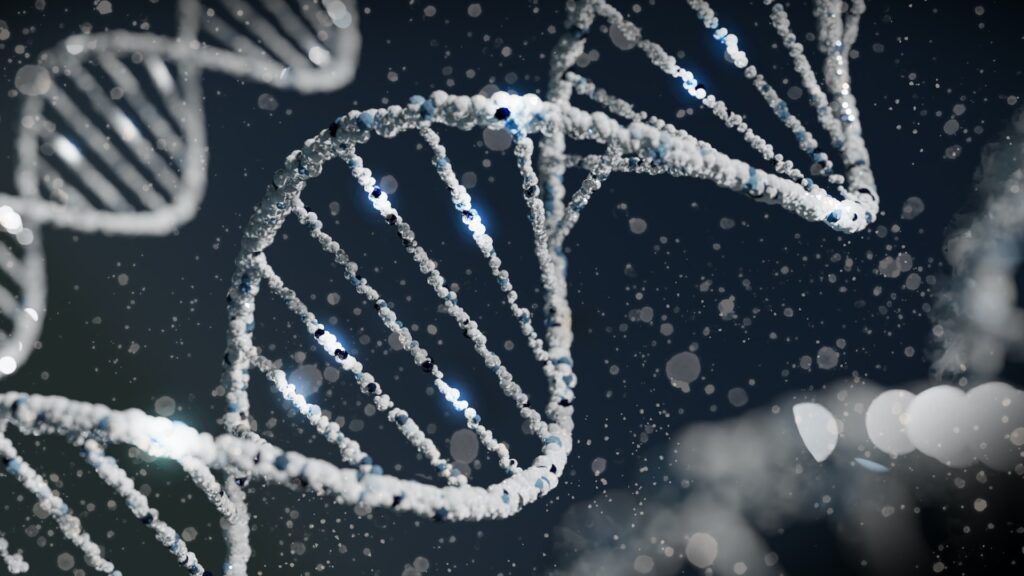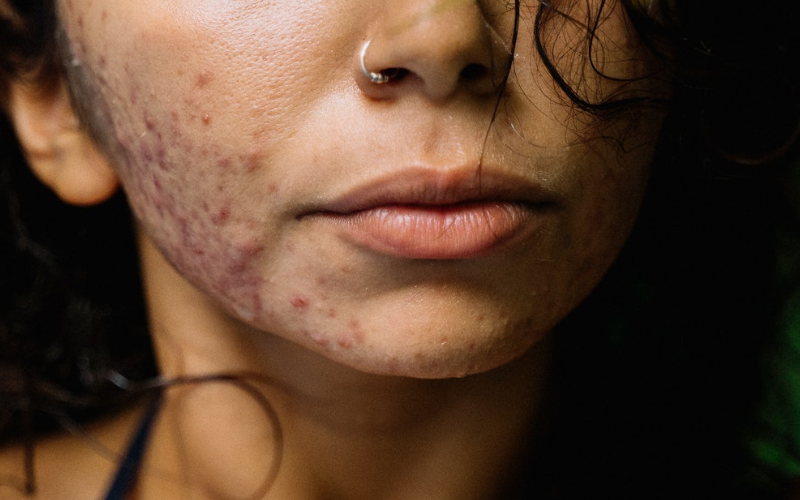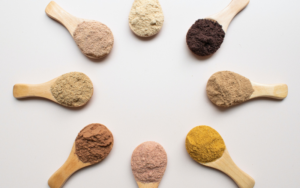Protein powder has become a staple in many fitness enthusiasts’ diets, whether their looking to build muscle, recover after a workout, or increase their daily protein intake. However, some individuals have raised concerns about a the connection between protein powder consumption, particularly whey protein, and acne breakouts.

In this article we’ll explore the relationship between protein powder and acne. We’ll examine the science behind it, identify who may be sensitive to breakouts from whey protein, and provide insights into which protein powders are less likely to contribute to acne issues.
No time to read? Click on conlcusion below and head straight to the conclusion of this article.
Table of Contents
Do protein powders cause acne
Indeed, the relationship between protein powders, particularly whey protein, and acne is a topic of concern for many. While some protein powders may be innocent in this regard, others might play a role in acne breakouts.
In the next section we’ll explore which specific protein powders may be more likely to contribute to acne and why this connection exists. It’s essential to understand which protein options to consider if you’re worried about acne issues.
Whey protein
Whey protein is a high-quality protein derived from milk during the cheese-making process. It contains a complete range of essential amino acids and is renowned for its rapid digestibility and absorption by the body.
Whey protein comes in various forms, including whey concentrate, whey isolate, and whey hydrolysate, each offering different benefits. Want to know more about The 3 types of Whey Protein check out the article.
Which protein powders cause acne
acne, it’s crucial to recognize that not all protein powders are created equal. Some protein sources may have a higher likelihood of contributing to acne breakouts. Here’s a list of specific protein powders associated with acne:
- Whey Protein
Whey protein, derived from dairy, is one of the most common culprits when it comes to protein powder-related acne [1]. The reason lies in its insulinotropic properties, which can elevate insulin levels in the body. Increased insulin levels may lead to higher sebum production and skin cell growth, factors that can contribute to acne development. - Casein Protein
Like whey, casein protein is derived from milk and may have similar insulinotropic effects. While casein is slower to digest than whey, it can still lead to elevated insulin levels in some individuals, potentially affecting their skin. - Mass Gainers
Mass gainer protein supplements, which often contain a combination of proteins, carbohydrates, and fats, can also be problematic for some people. The high carbohydrate content in these products may lead to spikes in insulin levels, potentially influencing acne development. - High-Sugar Protein Powders
Protein powders with added sugars or sweeteners may contribute to acne in individuals sensitive to sugar-induced insulin spikes. High-sugar protein powders can lead to rapid blood sugar fluctuations, which may impact skin health. - Soy Protein
While not as commonly associated with acne as whey or casein, soy protein is derived from soybeans, which contain natural plant compounds called phytoestrogens. In some cases, excessive phytoestrogen intake may impact hormone balance and skin health.
It’s important to note that not everyone will experience acne breakouts from consuming these protein powders. The relationship between protein powders and acne can vary from person to person, and other factors, such as genetics and overall diet, also play a role.
Who Is Sensitive to Breakouts From Whey Protein
While whey protein is a popular and highly digestible source of protein for many, some individuals may be more susceptible to experiencing acne breakouts when consuming it. Understanding who might be sensitive to these breakouts from whey protein can help individuals make informed dietary choices. Here are some factors that can influence this sensitivity:
Hormonal Sensitivity
Hormones play a significant role in the development of acne. Whey protein may impact hormone levels, particularly insulin-like growth factor 1 (IGF-1) and insulin, which can influence sebum production and skin cell growth. Individuals with hormonal imbalances or sensitivity may be more prone to acne triggered by whey protein.
Skin Type
Different skin types have varying levels of sensitivity to dietary factors. People with oily or acne-prone skin may be more likely to experience breakouts when consuming whey protein. Dry or less acne-prone skin types may be less affected.
Genetics
Genetics can play a role in how an individual’s body responds to dietary choices. Some people may have a genetic predisposition to acne development when consuming certain foods, including whey protein.

Dose and Frequency
The amount and frequency of whey protein consumption can also influence the likelihood of experiencing acne breakouts. Consuming excessive amounts of whey protein or using it frequently may increase the chances of adverse skin reactions.
Other Dietary Factors
Diet matters as well. Consuming a balanced diet rich in fruits, vegetables, whole grains, lean proteins alongside whey protein may help mitigate the risk of acne breakouts.
It’s important to note that while some individuals may experience acne breakouts from whey protein, others may not be affected at all.
Consider testing with alternate protein sources, such as plant-based proteins like pea or brown rice protein, to see if your skin reacts differently if you feel that whey protein is causing your acne.
Which protein powders do not cause acne
If you’re concerned about acne breakouts caused by protein powders, there are alternative protein sources that are less likely to contribute to skin issues. Here are some protein powder options that are generally considered less likely to cause acne:
- Bone Broth Protein
Bone broth protein is derived from simmered animal bones and connective tissues. It’s rich in collagen and various amino acids. Because it lacks dairy components and is low in carbohydrates, it’s less likely to influence insulin and IGF-1 levels, making it a suitable choice for those concerned about acne.
- Egg White Protein
Egg white protein is made from the whites of eggs and is free of dairy and lactose. It provides a complete source of protein with minimal carbohydrates. Egg white protein is generally well-tolerated and less likely to cause skin issues.
- Pea Protein
Pea protein, derived from peas, is a plant-based protein source that is dairy-free and low in carbohydrates. It’s an excellent choice for individuals with lactose intolerance or those looking to avoid potential acne triggers associated with dairy-based proteins.
- Brown Rice Protein
Brown rice protein is another plant-based option made from whole-grain brown rice. It’s dairy-free and low in carbohydrates, making it a suitable alternative for those concerned about acne-related to whey or casein protein.
Conclusion
The relationship between protein powders and acne is a complex one that can vary from person to person. While some individuals may experience acne breakouts as a result of consuming certain protein powders, others may not be affected at all. Here are the key takeaways from our exploration:
- Whey Protein and Acne: Whey protein, derived from dairy, has been associated with acne breakouts in some cases due to its potential to influence insulin and IGF-1 levels.
- Individual Sensitivity: Sensitivity to acne triggers in protein powders varies from person to person and is influenced by factors such as genetics, hormonal balance, and overall diet.
- Alternative Protein Sources: If you’re concerned about acne, there are alternative protein sources like bone broth protein, egg white protein, pea protein, and brown rice protein that are less likely to cause skin issues.
In determining whether protein powder, especially whey protein, contributes to acne breakouts, it’s important to monitor your skin’s reaction and consider consulting a healthcare professional for personalized guidance.
Sources
- https://www.ncbi.nlm.nih.gov/pmc/articles/PMC3900340/



